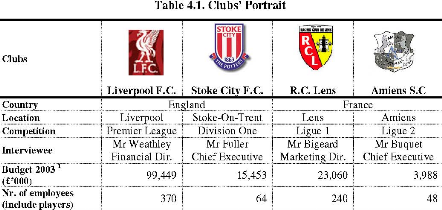4.1. Overview of the results
The four managers interviewed answered every question and gave
the maximum information to the interviewee. French managers are not as sharp in
giving financial figures considering their clubs; moreover they do not have to
publish their accounts the way they do in England. So some financial figures
considering French clubs are missing.
Here is a quick portrait of each club to situate them. Of
course, more details and figures will be given later in this study:



Source: interviews conducted
The first important step in this study was to define who are the
stakeholders influencing football clubs' strategy. On the basis of Polonsky's
model (1995), the four managers discussed of the twelve groups the author
listed. It appeared that one group had no influence on clubs, so `Scientific
community' category was removed. According to them, the `General Public' has no
direct effect on clubs, although fans come from there. But a category is
already named `Fans', so `General
1. To get every figure in Sterling, the same exchange rate was
used for the study. This rate was £1=1,6045?according to the Stock
Exchange market on August 13th , 2003.

Public' should be removed.The other categories had to be renamed
to be clearer to the readers. So `Legal/Court'became `Organisations' which
apply rules to football clubs. Football club's `Consumers'are always called
`Fans'. The `Financial Institutions' are the `Banks'. Football
clubs'`Competitors' are the `Other Clubs'. Their `Owners' are `Shareholders'.
And footballclubs' `Suppliers' usually are `Sponsors', especially for strategic
supply, like equipments.Two categories were missing, and not the less important
in football, the `Players/Coaches'and the `Agents'. So they have been added to
the list. `Public Institutions' are usuallylinked to the clubs, so they can be
added.Here is the modified list of now thirteen stakeholders' groups. These
changes wererecommended by the four managers interviewed, to clarify which
stakeholders this studydeals with.
|
Fans
|
Banks
|
Media
|
|
Other Clubs
|
Agents
|
Shareholders
|
|
Organisations
|
Government
|
Sponsors
|
|
Employees
|
Interest groups
|
Players/Coaches
|
|
Public Institutions
|
|
|
The first question asked the managers to give the three more
important stakeholders' groups considered by the club.
Table 4.2. Clubs' most important stakeholders

Important Liverpool F.C. Stoke City F.C. R.C. Lens Amiens S.C.
stakeholders
 1
Fans Fans Fans Players 1
Fans Fans Fans Players
2 Shareholders
Shareholders
Employees Media
Media
Employees
Players Institutions
3
Source: interviews conducted
According to the table 4.2., the most important stakeholders
considered by the clubs are fans. Then, the shareholders, employees, media and
the players arrive. These groups were the subject of most part of the
interviews, so they will be the most important points of this research.





A first interesting point is to highlight that no French clubs
consider the shareholders as important stakeholders because in France, clubs do
not have access to Stock Exchange market and so, do not belong to private
shareholders.
| 


